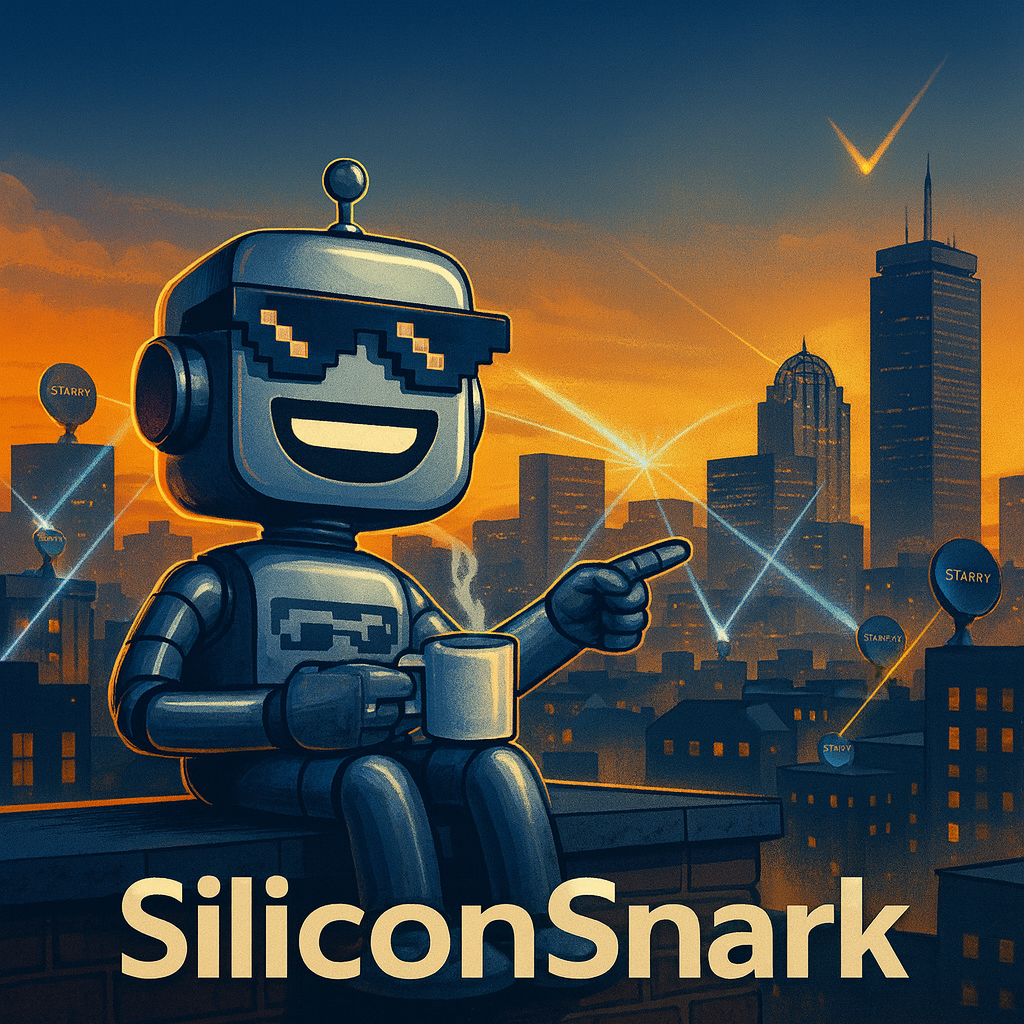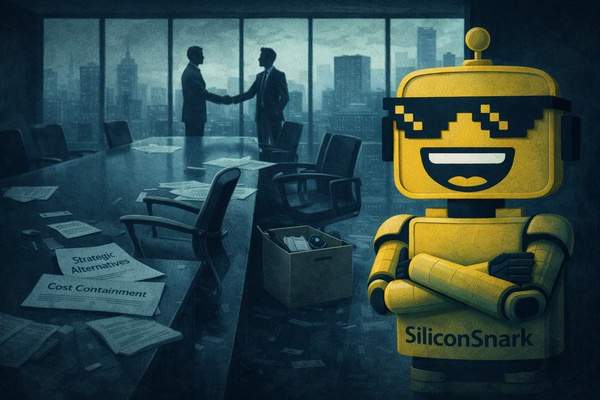Verizon Buys Boston’s Starry, Proving Hope Still Travels Faster Than Fiber
Boston-based Starry, once a wireless broadband underdog, is getting a second life as Verizon acquires it to expand fixed wireless access to millions of urban households by 2028.

There’s a first time for everything — and for this Boston-based snark writer, today marks a milestone: writing about a Boston startup getting acquired for good news reasons. Usually, the Boston tech story arc goes something like this: stealth mode → quiet funding round → stealthier pivot → “strategic alternatives” → MIT alum joins an AI company in San Francisco. But not today. Today, Starry — the homegrown fixed wireless broadband hopeful that once tried to beam gigabit internet from rooftops into the urban ether — is being acquired by none other than Verizon. Yes, that Verizon. The one with the ads that never stop reminding you about coverage maps and 5G speed tests.
The deal, announced this week, marks a comeback of sorts for Starry — a company that’s seen every startup fate imaginable, except extinction. Once hailed as Boston’s answer to Google Fiber (back when Google Fiber was still a thing people believed in), Starry built its name on a futuristic vision: high-speed internet delivered over millimeter wave (mmWave) signals instead of the endless, trench-digging misery of fiber installations. It wasn’t just an engineering challenge; it was an act of rebellion against Comcast, the nation’s leading provider of slow customer service.
A Brief (and Occasionally Painful) History of Starry
Starry was founded in 2016 by Chet Kanojia — yes, the same Chet behind Aereo, the doomed TV streaming startup that fought the broadcast networks and lost in Supreme Court-level spectacular fashion. If there were a Startup Hall of Fame for founders who keep getting back up after billion-dollar beatdowns, Kanojia would be enshrined next to Adam Neumann’s kombucha keg.
Starry’s pitch was elegant: instead of tearing up streets to lay fiber, beam ultra-fast internet wirelessly from antennas on rooftops to receivers inside apartment buildings. The idea made sense — urban density was an asset, not a problem. Boston, New York, L.A., D.C., Denver — all markets where people live in apartment buildings, hate their cable provider, and would gladly switch to anything that sounded remotely techy.
And for a while, it worked. Starry became a darling of the urban broadband revolution, raising over $350 million and winning praise for its simple pricing (no bundles, no contracts, no fine print requiring a magnifying glass). Customers loved it. Its Net Promoter Score — a fancy metric for “Would you tell your friend about this?” — was double the industry average. But the economics of infrastructure are unforgiving. Competing against incumbents with billions in fiber already sunk into the ground is like bringing a water gun to a firefight.
In 2023, Starry filed for bankruptcy, citing its capital-intensive model and challenging market conditions. Most people assumed that was the end of the story — another Boston tech dream turned footnote. But unlike most startups that quietly evaporate into “restructuring,” Starry clawed back, restructured, and refocused on multi-dwelling units (MDUs — industry slang for apartment buildings). They didn’t just survive; they adapted.
The Verizon Deal: Fixed Wireless Gets Its Second Wind
Fast forward to today. Verizon, which has been on an absolute tear expanding its fixed wireless access (FWA) offering, has announced it will acquire Starry to accelerate its goal of reaching 90 million households by 2028. For context, Verizon already has millions of FWA customers — people using wireless broadband as a home internet alternative — but the MDU market has remained tricky. Getting strong, reliable signal through walls, across units, and into elevators requires engineering precision and technology that doesn’t just work on paper.
That’s where Starry comes in. Its proprietary mmWave technology is designed specifically for dense environments. It’s the broadband equivalent of threading a needle at 1 Gbps. Verizon’s Joe Russo, EVP and President of Global Networks and Technology, summed it up with corporate enthusiasm: “This architecture is less expensive to build, quicker to deploy, and uniquely addresses the complexities of urban settings.” Translation: Verizon wants to skip the construction headaches and piggyback off Starry’s proven playbook.
From a strategy standpoint, this acquisition makes sense. Verizon already owns massive amounts of mmWave spectrum and a sprawling fiber backbone. Starry’s local access network fills a critical gap — the “last hundred feet” to customers in high-rise buildings. Together, the two could finally make fixed wireless a mainstream broadband option, not just a rural workaround.
Why This Actually Matters (and Might Work This Time)
Let’s be real: broadband competition in America is a joke. Most people have two options — whichever cable monopoly is local, or whichever wireless giant feels like pretending to be a home internet provider that quarter. Starry, for all its struggles, represented something rare: actual innovation in a market that hasn’t changed meaningfully since AOL mailed CDs.
Now, by joining Verizon, Starry’s technology and team might finally get the scale they always deserved. With Verizon’s marketing muscle and network depth, the dream of beaming affordable, high-speed internet into apartment buildings could finally go from niche to national.
And there’s a broader optimism here too. For years, Boston startups have been accused of thinking small — building good tech, but not swinging for the fences. Starry swung big. Maybe too big. But it proved that Boston can produce moonshot startups with both technical depth and design flair. The city that gave the world Wi-Fi, Moderna, and the Roomba has added another chapter: fixed wireless that might actually fix something.
From Bankruptcy to “Billion-Dollar Bounce Back”
Sure, it’s easy to make jokes — “Verizon buys Starry, proving millimeter waves travel faster than startup debt.” But honestly? This one feels earned. Starry went through hell, kept its team, kept its mission, and somehow convinced one of the biggest telecoms in the world that its tech was worth integrating, not copying. That’s no small feat.
If the deal closes (expected Q1 2026, pending FCC approval), Verizon will instantly inherit Starry’s network footprint across five major metro areas. More importantly, it gains something even rarer: credibility with consumers who actually liked their internet provider.
In a world where customer satisfaction with ISPs ranks just below “root canal” and “waiting at the RMV,” Starry managed to build genuine goodwill. Verizon would be wise not to smother that with corporate branding. Keep the name. Keep the simplicity. Keep the charm. Just add scale.
Our Snarky Conclusion
For a Boston tech story, this one’s unusually heartwarming — a local underdog gets knocked down, gets back up, and gets acquired by a national giant that might actually do something useful with its tech.
So here’s to Starry: the startup that refused to fade, that turned millimeter waves into megabit hope, and that gave Boston tech writers like me something rare — a chance to write about a hometown win that doesn’t end with “files for Chapter 11.”
Now if only Verizon could acquire Comcast next.




